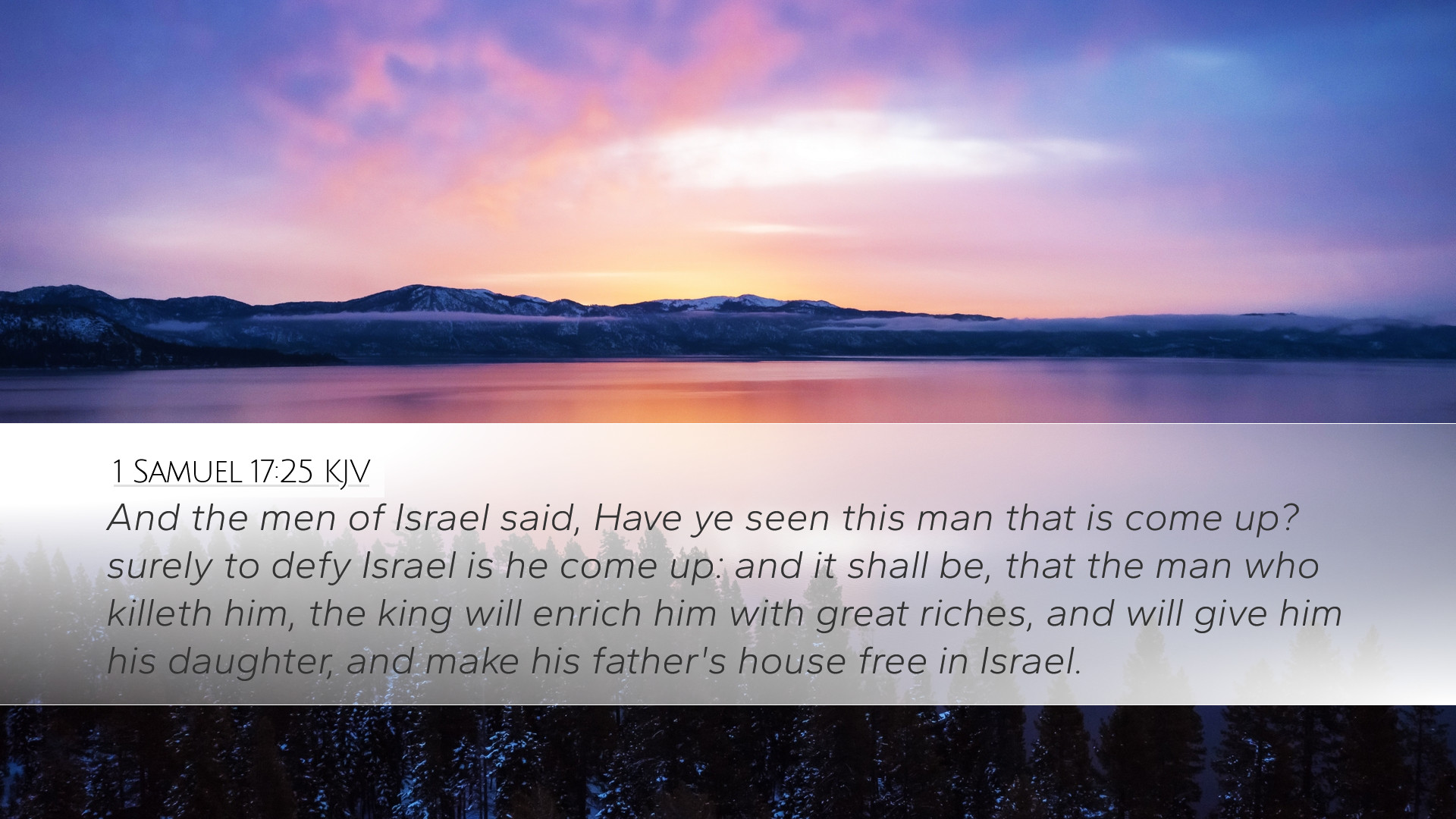Commentary on 1 Samuel 17:25
Bible Verse: "And the men of Israel said, Have you seen this man that is come up? Surely to defy Israel is he come up: and it shall be, that the man who kills him, the king will enrich him with great riches, and will give him his daughter, and make his father's house free in Israel."
Introductory Remarks
This verse serves as a pivotal moment that encapsulates the tension between faith and fear in Israel during the reign of Saul. It highlights the fear instilled by Goliath among the Israelite soldiers and sets the stage for David’s remarkable faith and eventual triumph over the giant. The public domain commentaries provide profound insights into the cultural, theological, and ethical implications inherent within this passage.
Contextual Analysis
1 Samuel 17 depicts the confrontation between the Israelites and the Philistines, with Goliath representing the ultimate challenge to Israel's faith. In verse 25, the Israelite soldiers express not only fear but also a sense of desperation, as they recognize the consequences of this battle.
Matthew Henry's Commentary
Matthew Henry emphasizes the psychological state of the Israelite soldiers, noting their dismay. He points out that the Israelites are aware of Goliath's challenge, which represents a blatant defiance towards God. Henry elaborates that the mere presence of Goliath instills terror in the hearts of the soldiers, who are paralyzed by fear rather than emboldened by their faith.
Albert Barnes' Notes
Albert Barnes offers insight into the societal implications of Goliath's challenge and the rewards promised to the one who defeats him. He highlights the significance of the king's promise of riches and connection to the royal family, which serves to motivate the soldiers, reflecting the deep desire for glory and security among the Israelites. Barnes posits that the reward offered was an appeal to the human desire for honor, emphasizing the contrast between earthly incentives and spiritual fortitude.
Adam Clarke's Commentary
Adam Clarke provides a theological interpretation, suggesting that this moment underscores the moral failure of Saul's leadership. The fear exhibited by the soldiers can be seen as a direct result of the king’s own spiritual disarray. Clarke also points out that Goliath's challenge not only defies Israel but ultimately stands in opposition to the sovereignty of God. The promise of wealth and honor offered by Saul, according to Clarke, reflects humanity's tendency to seek worldly solutions to spiritual problems.
Thematic Insights
This verse provides rich themes worthy of exploration:
- The Nature of Fear: The expressions of fear among the soldiers resonate with the human experience. This fear can paralyze action and cloud judgment, as illustrated by the Israelite army.
- The Call to Faith: In the face of overwhelming odds, God’s call to faith becomes critical. The response of David, contrasting the fear of the armies, reveals a deeper trust in God's power.
- Motive for Action: The promise of worldly rewards introduces a complex dynamic where motivations can be both noble and selfish. This sets the stage for the introduction of David, whose motivations align more closely with God's purposes.
- Leadership and Responsibility: Saul’s inability to confront Goliath or inspire his troops illustrates the great burdens of leadership, particularly when it lacks divine backing.
Conclusion
The commentary on 1 Samuel 17:25 invites pastors, students, theologians, and scholars to reflect on the balance of faith and fear within their own lives and ministries. The lessons drawn from this passage continue to resonate, challenging the faithful to rise above fear through reliance upon God, who is more than able to deliver His people. This narrative prepares the reader’s heart for the introduction of David, illustrating the transformative power of faith in God against seemingly insurmountable odds.


